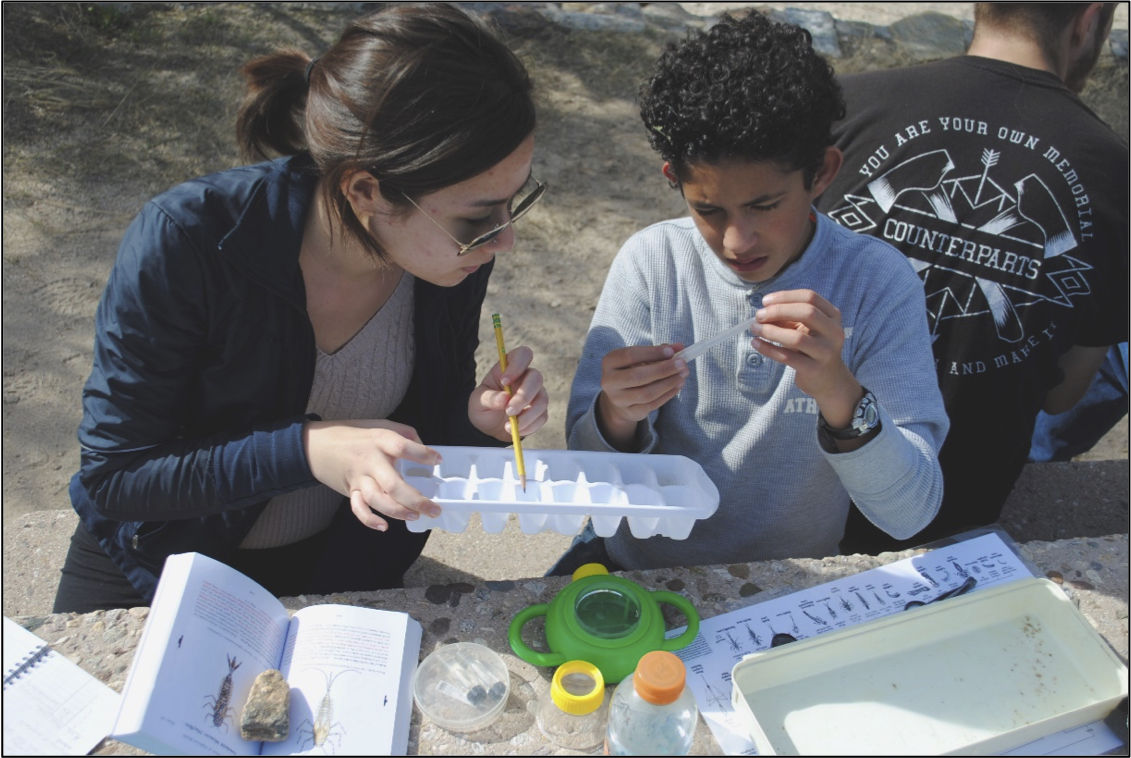Building environmental stewardship and engagement with public lands is a central challenge for youth education in southern Arizona. The Tucson area is home to almost a million people, of which 20% live below the poverty line. While the city is surrounded by a national park and a national forest, there is no public transit to any public land, and lack of vehicle access prevents many people from traveling on their own. Research also suggests that underserved groups are less likely to be involved in environmental careers because of lack of role models, limited relevance of the environment to their daily lives, and few opportunities to engage. There is thus an opportunity to better connect young people to their natural environments in order to build the next generation of environmental stewards and leaders.
To address this challenge, we have been running a research apprenticeship program through the University of Arizona Sky School for the past two years. Our assistant director Rebecca Lipson and our instructor Keating Godfrey have been the key people shaping this initiative, with support from our director Alan Strauss.
In the program, students in grades 8-12 in conduct scientific research outdoors while learning about natural spaces around Tucson, Arizona, primarily in the Sabino Canyon Recreation Area (Coronado National Forest). Students work with undergraduate and graduate student mentors from September to April to complete a research project for entry into the regional science fair (SARSEF). Each research team is focused on a particular scientific discipline—entomology, hydrology/geology, plant sciences, or human impacts on wildlife. Over multiple weekend excursions, these participants hike in the canyons, deserts, and mountains, gaining experience asking and answering scientific questions about the natural environment, while discovering their own place in it.
Rebecca and Keating have made some great progress in building access and inclusion within the field sciences. In the first two years of pilot programs, 40% of our participants have come from Title I eligible schools, and over 90% stay with the program through completion. We facilitate strong positive outcomes for these students. More than 50% of our participants receive awards in the regional science fairs – about five times higher than average.
This translates into affirming experiences for our students that help facilitate student sense of belonging in science and in higher education, as well as positive identification with our diverse group of university mentors. We are still improving the program and exploring new ways to more effectively reach and include more diverse groups of students – but so far I think we are doing something right.
The challenge has been funding. We thought we would not have the financial resources to support a third year of this program. Fortunately, we were just notified out that the program will be underwritten in 2017-2018 by The North Face’s Explore Fund, which seeks to inspire and enable the next generation of explorers and conservationists.
Through their very generous grant support, we will be able to once again provide these research apprenticeship opportunities to the Arizona community. I am grateful for their support of our efforts, and excited to see the impact they will help us making in the coming year.
If you would like to find out more about this program, and learn how to replicate it at your institution, come check out our poster at the Ecological Society of America annual meeting in Portland, Oregon in August – we are presenting on Tuesday afternoon (PS22-85). Or if you know a student who might be interested in applying for our program, get in touch by email – we will have application instructions available online very soon!







Comments
One response to “Just funded – field research apprenticeships for Arizona K-12 students”
Thank you for taking the time to blog about this and getting the word out. I hadn’t thought about the problem of no public transport to park lands. So many layers of issues preventing these kids from both science and the outdoors. Keep doing the creative problem solving to create change!